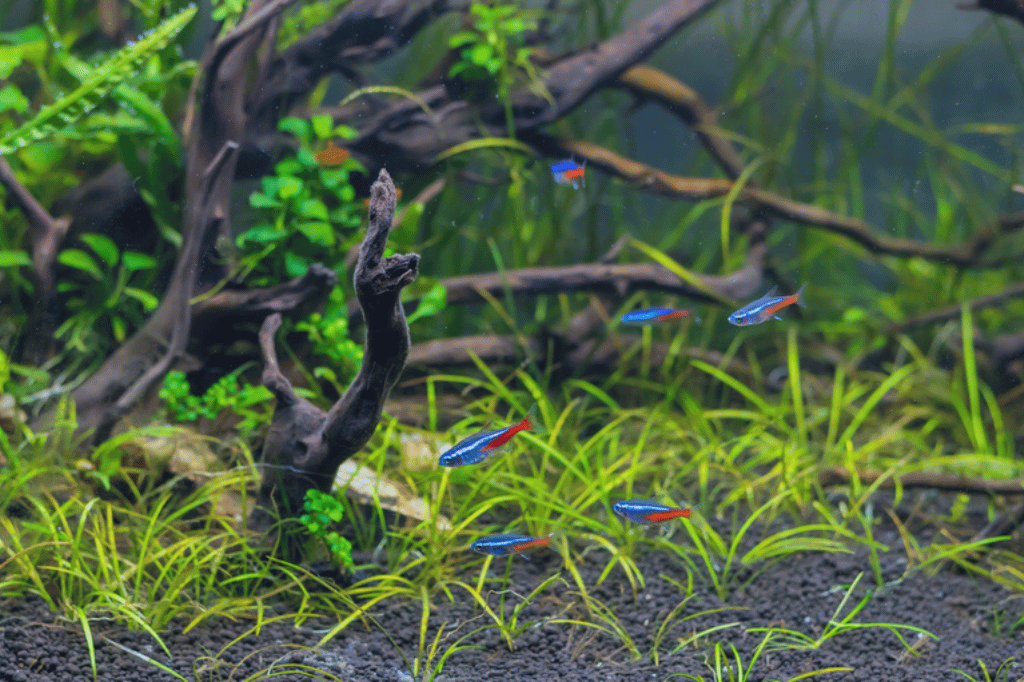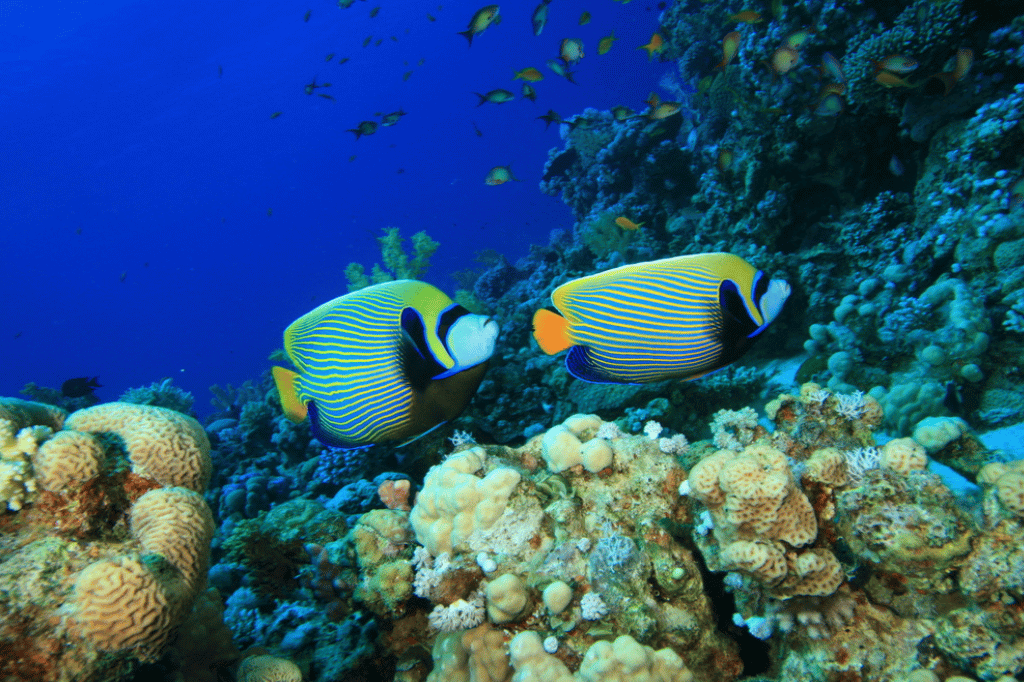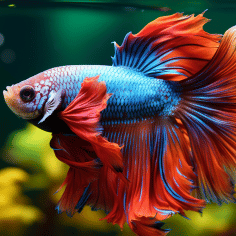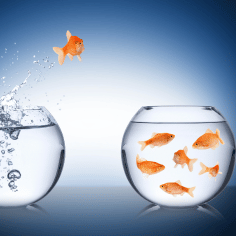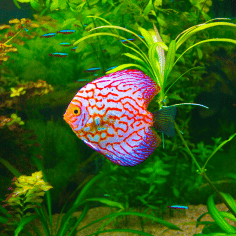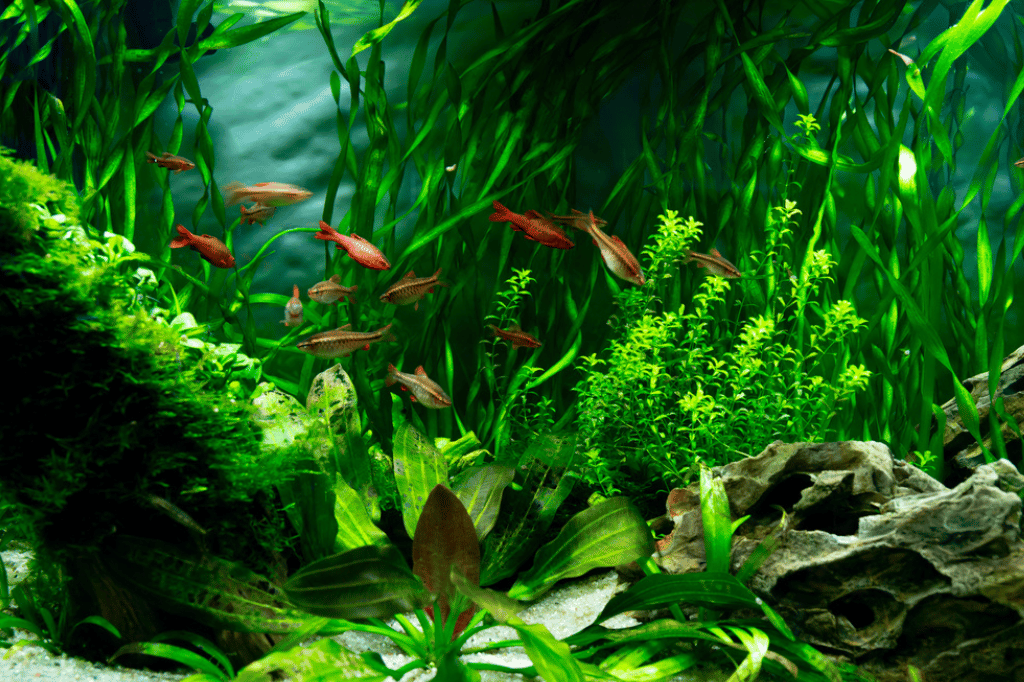Understanding the delicate balance marine life requires is crucial for aquarium enthusiasts and ecological conservationists alike. Saltwater fish have evolved to live in environments with high salt concentrations. Their cells and organs function optimally in such conditions, and a sudden shift to freshwater can cause their bodily systems to fail.
This transition challenges their ability to regulate water and salts within their bodies, often leading to fatal outcomes. Maintaining the right habitat for these fish is essential, whether in the wild or in controlled environments like aquariums. Our oceans’ biodiversity depends on the stability of various aquatic ecosystems, highlighting the importance of respecting the natural habitats of saltwater species.

Can Saltwater Fish Survive in Freshwater? Myth Debunked! By Insiderfish.com
Introduction To Saltwater And Freshwater Habitats
Can Saltwater Fish Survive in Freshwater ? Exploring the worlds of saltwater and freshwater habitats reveals the unique lives of fish and other aquatic species. Each environment supports different adaptations and survival strategies.
Characteristics Of Saltwater Environments
Saltwater habitats, covering about 71% of the Earth’s surface, are vast and varied. Oceans and seas fall into this category. Here are key features:
- High salinity: Generally, saltwater has about 35 parts per thousand of salt.
- Stable temperatures: Large bodies of water do not change temperature quickly.
- Diverse ecosystems: Coral reefs and deep-sea vents are examples.
Characteristics Of Freshwater Environments
Freshwater environments are essential for many forms of life, including humans. These include rivers, lakes, and ponds. Notable characteristics are:
- Low salinity: Freshwater has less than 1 part per thousand of salt.
- Variable temperatures: These waters can change rapidly with air temperature.
- Richer in nutrients: They often have more nutrients per gallon than saltwater.
Understanding these habitats helps us appreciate why saltwater fish struggle in freshwater environments and vice versa. Their bodies are not suited for the drastic change in salinity and other living conditions.

Credit: www.quora.com
Physiological Differences Between Saltwater And Freshwater Fish
Osmoregulation In Fish
Osmoregulation is the process through which fish maintain their internal salt and water balance. Saltwater fish face a constant risk of dehydration because their environment has a higher salt concentration than their bodies. To counteract this, they drink large amounts of water and excrete excess salt through their gills and kidneys. In contrast, freshwater fish live in an environment where the salt concentration is lower than their bodily fluids. They absorb water through their skin and gills, rarely drink, and their kidneys work to expel the excess water while retaining salts.Adaptive Features For Specific Water Types
- Saltwater Fish Adaptations:
- Specialized gills to excrete salt
- Efficient kidneys to filter out salt
- Cells that retain water efficiently
- Freshwater Fish Adaptations:
- Permeable gills for water absorption
- Highly active kidneys to expel water
- Cells that regulate ion intake
The Science Behind Osmotic Pressure
How Osmotic Pressure Affects Fish
Fish cells have salt. The water around them has salt too. Osmotic pressure is the force of water moving. It moves between the fish and the water outside. If the balance is not right, fish can get sick. In saltwater, fish work to keep water in. In freshwater, they work to keep salt in. It’s all about balance.Comparative Analysis: Saltwater Vs. Freshwater Fish
Let’s compare saltwater and freshwater fish. Both types manage osmotic pressure differently.| Saltwater Fish | Freshwater Fish |
|---|---|
| They drink lots of water. | They do not drink much water. |
| Extra salt goes out through gills. | They keep salt inside their body. |
| They pee a little, very salty. | They pee a lot, not so salty. |
Common Myths Surrounding Fish Survival
Can Saltwater Fish Drink Freshwater?
It’s a common question whether saltwater fish can drink freshwater. The answer isn’t straightforward due to the complex nature of fish biology. Saltwater fish are equipped with specialized cells and organs that help them maintain the right balance of salt and water in their bodies. This balance is crucial for their survival. Saltwater fish do drink water, but their bodies are designed to process the saline environment they are accustomed to. When introduced to freshwater, their internal salt levels can become diluted. This can lead to a condition called osmotic shock, which can be harmful to the fish.Myth Of Immediate Adaptation
The myth of immediate adaptation is a popular but mistaken belief. It suggests that fish can quickly adjust to drastic changes in their environment. In reality, the process of adaptation, if possible, is gradual and complex.- Saltwater to Freshwater: For a saltwater fish, switching to freshwater isn’t an instant process. It requires a significant physiological change.
- Adaptation Time: Some species may adapt over generations, but not within an individual fish’s lifetime.
- Survival Chances: Without the ability to adapt quickly, most saltwater fish would not survive in freshwater.
Historical Experiments On Fish Adaptability
Notable Scientific Studies
Over the years, several significant studies have taken place. These experiments aimed to determine if and how saltwater fish might endure in freshwater conditions. Some of the most groundbreaking work includes:- J.S. Haldane’s early 20th-century observations on fish osmoregulation.
- E.J. Bath’s 1960s experiments with different fish species.
- Contemporary research conducted with advanced genetic tracking.
Key Findings On Fish Adaptation
These studies have consistently highlighted a few key points regarding fish adaptation:- Physiological Plasticity: Some species exhibit the ability to adjust their body functions to survive changes in water salinity.
- Genetic Factors: Certain fish have genetic traits that favor survival in varying environments.
- Survival Limits: There are thresholds to how much a fish can adapt, which vary from species to species.

Can Saltwater Fish Survive in Freshwater ?
Real-life Instances Of Environmental Shift
Accidental Introductions
Accidental introductions occur when saltwater species find themselves in freshwater due to human activity or natural events. The outcome can be surprising.- Bull sharks, known for their tolerance of freshwater, have navigated up rivers far from the sea.
- Instances of tropical fish released from aquariums into rivers showcase unexpected survival.
Controlled Experiments In New Habitats
Scientists conduct controlled experiments to study how saltwater fish cope in freshwater. These studies shed light on the adaptability of various species.| Fish Species | Experiment Duration | Survival Rate |
|---|---|---|
| Mollies | 2 months | High |
| Guppies | 3 weeks | Moderate |
| Damsel Fish | 1 month | Low |
Conservation Implications Of Fish Translocation
Impact On Biodiversity
Biodiversity is the backbone of healthy ecosystems. Introducing saltwater fish to freshwater can disrupt this balance. Native species may face competition for food and habitat. This competition can lead to declines in local fish populations and alter the ecosystem’s structure.Risks Of Invasive Species
A fish out of its usual water can become invasive. An invasive species spreads quickly and can overpower native life. They often lack natural predators in new environments, allowing them to thrive unchecked. This can lead to a decrease in local species and a loss of biodiversity.- Altered food webs
- Changed physical environments
- Decreased water quality
Conclusion: Debunking The Myth
Summary Of Scientific Insights
Understanding how fish survive involves biology and chemistry. Fish are equipped with special cells that regulate internal salt concentration. Saltwater species have evolved to excrete excess salt and retain water, which is the opposite for freshwater species. Here’s what science tells us:- Osmoregulation is key for fish survival.
- Saltwater fish cannot regulate their salt intake in freshwater.
- Cellular imbalance leads to fatal consequences.
Final Thoughts On Fish Survival Across Waters
Our exploration confirms that saltwater fish face serious challenges in freshwater. Without the ability to maintain their internal equilibrium, they struggle to survive. Here are the key points:- Fish have specific adaptations for their natural habitats.
- Survival across waters is not commonly feasible.
- Respecting natural ecosystems is crucial for fish welfare.
Frequently Asked Questions Of Can Saltwater Fish Survive In Freshwater
What Happens If You Put A Saltwater Fish In Freshwater?
Putting a saltwater fish in freshwater can cause osmotic shock. The fish’s cells may swell and burst, leading to severe stress, illness, or death.
How Long Can A Saltwater Fish Survive In Freshwater?
Saltwater fish typically cannot survive in freshwater for long. The sudden change in salinity can shock their systems, leading to severe health issues or death within minutes to a couple of hours.
What Saltwater Fish Can Live In Freshwater?
Most saltwater fish cannot thrive in freshwater. However, certain species like the bull shark and the mangrove rivulus can adapt and survive in both environments. These fish have unique physiological adaptations that allow them to manage drastic changes in salinity.
How Long Can A Clownfish Live In Freshwater?
Clownfish cannot survive in freshwater as they require saltwater environments. Their life expectancy depends on living in marine habitats.
Conclusion
Can Saltwater Fish Survive in Freshwater? Understanding the environmental needs of saltwater fish is crucial for their survival. Freshwater can pose a lethal threat to these marine creatures, lacking the necessary salt content they require. It’s vital for aquarium enthusiasts and researchers alike to respect the delicate balance of aquatic life, ensuring species thrive in appropriate habitats.
Keep oceans and rivers teeming with diversity by recognizing the importance of their native environments.


